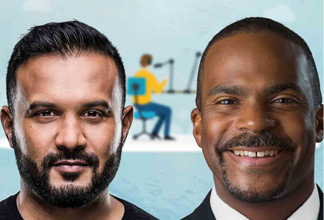Who Owns Who in the Tech World?
Written by Peter Nowak | Published on May 30, 2018
Written by Peter Nowak | Published on May 30, 2018
For much of the 20th century, the average consumer could walk into a department store and choose from a wide range of goods on offer.
The internet today is similar when it comes to choice, but the department store owners are dramatically different. Rather than the Sears or Eaton's of the past, they're now often Google, Amazon and Facebook, each offering its own multitude of products and services.
Walking into a department store, you would know exactly what store you were in — the name displayed prominently upon entry. One of the biggest contrasts with this "new" era is that it's not always obvious which online services fall under which company's umbrella. On the internet, it's often hard to tell whose department store you're in.
In that vein, here's a handy scorecard for keeping track of "who owns who" among the biggest online players.
Google: It's amazing to think that Google was once just a search engine. Twenty years later (it launched in 1998), the behemoth offers email, mapping, video streaming, cloud services, smartphone software...and the list goes on.
Google grew so much that in 2015 it reorganized to form Alphabet, a parent company to oversee efforts ranging from broadband network deployment to life-extension research.
Google's first big foray outside "search" came in 2006 with its $1.6 billion (all figures U.S.) acquisition of YouTube. The fast-growing video website held appeal to a company that was in the early days of adopting advertising as its primary revenue generator. YouTube now boasts more than 1 billion users.
Google is also a big player in maps, bolstering that business when it acquired Waze in 2013 for $966 million. The navigation and traffic app was growing quickly in popularity, with about 50 million users at the time. The mapping space was also hot, with a number of online giants snapping up related startups.
Alphabet has also been showing increased interest in smart homes in recent years, which explains the $3.2 billion purchase in 2014 of Nest Labs. Starting with a smart thermostat, Nest has since expanded into wi-fi-connected security cameras and, most recently, video doorbells.
Amazon: Just as Google started with search, so too did Amazon begin with a single service – online book sales. Hard to believe now! The company's portfolio has ballooned, ranging from website hosting to tablets and streaming devices.
One of Amazon's first non-book-related acquisitions came in 1998 with the Internet Movie Database, or IMDb, for an undisclosed amount. The move heralded the company's eventual entry into selling DVDs, which ultimately led to its current video streaming service.
Amazon also continued to grow its core field, with a $300 million acquisition of audio book firm Audible and Victoria-based art book vendor AbeBooks for an undisclosed amount. Both were picked up in 2008. Amazon also purchased digital comic book purveyor ComiXology in 2014 for an undisclosed amount. All three companies continue to operate under their own respective banners.
The online retailing giant is also a player in the video game arena, making two notable purchases in 2014. The first was Double Helix Games, maker of the popular Silent Hill and Killer Instinct franchises, for an undisclosed amount. Next up was video game streaming site Twitch for nearly a billion dollars.
Amazon's biggest acquisition was also possibly its most surprising — the nearly $14 billion purchase of grocery store chain Whole Foods Market in 2017, signalling a serious move into bricks-and-mortar retailing. The company also has its eyes on the smart home, or at least making parcel deliveries more convenient and safer, prompting its billion-dollar purchase earlier this year of video doorbell maker Ring.
Facebook: The social network has also been busy with acquisitions since its founding in 2004, both on the defensive and expansion fronts.
The company bought photo-sharing app Instagram in 2012 for $1 billion, and would then dwarf that purchase by grabbing instant messaging service WhatsApp two years later for $19 billion.
Facebook's biggest effort to grow outside its core field took shape through its acquisition in 2014 of virtual reality headset maker Oculus VR for around $2 billion. At the time, company founder Mark Zuckerberg said VR represents a new communications medium with boundless possibilities.
Things move fast in the technology world — you never know who could own who next! News & Headlines can help keep you stay on top of what's happening out there.
RBC Direct Investing Inc. and Royal Bank of Canada are separate corporate entities which are affiliated. RBC Direct Investing Inc. is a wholly owned subsidiary of Royal Bank of Canada and is a Member of the Investment Industry Regulatory Organization of Canada and the Canadian Investor Protection Fund. Royal Bank of Canada and certain of its issuers are related to RBC Direct Investing Inc. RBC Direct Investing Inc. does not provide investment advice or recommendations regarding the purchase or sale of any securities. Investors are responsible for their own investment decisions. RBC Direct Investing is a business name used by RBC Direct Investing Inc. ® / ™ Trademark(s) of Royal Bank of Canada. RBC and Royal Bank are registered trademarks of Royal Bank of Canada. Used under licence. © Royal Bank of Canada 2018. All rights reserved.
The views and opinions expressed in this publication are for your general interest and do not necessarily reflect the views and opinions of RBC Direct Investing. Furthermore, the products, services and securities referred to in this publication are only available in Canada and other jurisdictions where they may be legally offered for sale. If you are not currently resident of Canada, you should not access the information available on the RBC Direct Investing website.

Sustainable practices may mean untapped profits for Canadian farmers, says RBC Economics and Thought Leadership.

Top takeaways from a discussion about the climate challenges and solutions that can be found in farming.

Key takeaways from a conversation on Black representation in a recent episode of Disruptors, an RBC podcast.